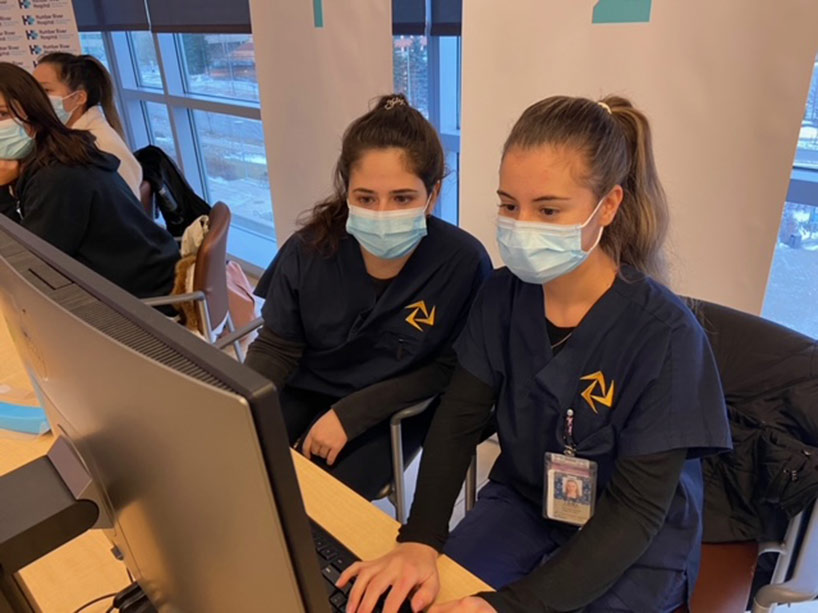Fourth-year Ryerson nursing students on the front line of the COVID-19 pandemic

The Daphne Cockwell School of Nursing has partnered with Humber River Hospital to send 64 nursing students to support its COVID-19 vaccination and testing clinic.
In a year unlike any other, innovation and collaboration have been vital at the Daphne Cockwell School of Nursing (DCSN), which has seen an increase in applications (external link) over the pandemic.
Early on, the DCSN community worked together to donate PPE and hospital equipment.
Now, the school has developed new practical placements so nursing students can meet hospitals’ current needs and their educational objectives. Practicum placements exist throughout the nursing education program. They are part of the process of maintaining the much-needed supply of fully trained nursing graduates that play such an essential role in our health-care systems.
Nursing students completing placements at Humber River Hospital
“This is a new and unique collaboration with Humber River Hospital (HRH). (external link) We have nursing students administering COVID-19 vaccines. Additionally, we have students filling key roles in staffing COVID-19 testing sites,” says Susana Neves-Silva, manager, Central Placement Office and Simulation, DCSN. “If you are getting a COVID-19 test during the week at a major Toronto hospital, the test is probably administered by a DCSN student, under a preceptor supervision model.”
When Derek Hutchinson, director of professional practice at HRH, called DCSN to say the hospital needed 64 students to be ready to open a vaccination clinic in two weeks, Neves-Silva says fourth-year students were ready to fill this need. “Our students were able to step in and help alleviate some of the stress in the system, delivering this important program. We want to do everything we can to support our health care community and teaching partners,” says Neves-Silva. “We’ve set up these programs with a preceptor supervisory model to both provide the services needed and meet our educational objectives.”
Thanks to the pre-grad @RyersonU students who are supporting #TeamVaccine on our quest in #DeliveringHope as we administer all second doses💉 to our 36 LTC, RH, NH and #COVaxClinic! #InThisTogether pic.twitter.com/jYX9535Hde
— Humber River Hospital (@HRHospital) February 11, 2021
Responding to community partner needs
“It would be challenging for us to manage the vaccine administration, working on the short delivery notice, without affecting the patient care, given the current clinical needs in our hospital at the moment,” says Hutchinson. “DCSN’s fourth-year students and collaborative program nurses have facilitated vaccinations with our Wilson site and our long-term care partners in the community. DCSN’s support means we could facilitate this clinic without affecting patient care or staffing levels in other areas of our hospital system. DCSN has provided us with the equivalent of 64 front-line staff, so this has made a big difference to us.”
“We can’t turn away from our partners because there are fewer conventional placements at the moment. Our students need and want to be trained to work in the areas of greatest need. This step in the learning process is an important partnership. Not just between HRH and DCSN but between the preceptors and nursing students,” says Hutchinson.
The practical training that nursing students are getting through clinics like these are really a once in a lifetime opportunity, says Hutchinson. “Many of the previous pandemics we’ve had were hospital-spread. COVID-19 is a community-spread pandemic. We’ve also never had this need or this type of sustained practical training opportunity before. These nursing students will graduate with the practical skills and experience needed throughout our health-care system now. Even with delays in vaccine shipments, we’ve set up the program to include administering vaccines in long-term care homes, where we have some of the greatest need for support. Residents and staff are pleased to have them in this program and have continuously recognized the Ryerson DSCN students for their level of engagement and professionalism.
HRH has welcomed 825 students in various placement roles across their organization throughout the winter 2021 semester. “HRH understands the value that student support provides to our staff and patients, and the learning our staff provide to students, creating a cycle of professional development. Students working with us today will see the full scope of internal and external drivers that influence their day-to-day work. “
Hutchinson underscores the importance of having these placements available to students right now. “It means that our future nursing leaders will be better prepared when the next pandemic happens, and our system will depend on their leadership. It is an opportunity to support the staff and get fundamental learning that they otherwise wouldn’t get,” he says. “We also benefit from these students in the long run in ensuring the stability of our healthcare workforce.”
“The flexibility and availability of these students and the faculty at Ryerson has been amazing. We are so proud of the students working in the vaccine clinic, managing multiple roles from scheduling and registration desks, providing vaccines and health teaching and through to the discharge process. This collaboration continues to be such an important relief for the hospital and fills a vital role in ending the current COVID-19 pandemic. The opportunity to experience working in the COVID-19 vaccine clinic has facilitated a wonderful training experience for what the future may hold upon graduation, and with whatever pandemic might be next,” says Hutchinson.